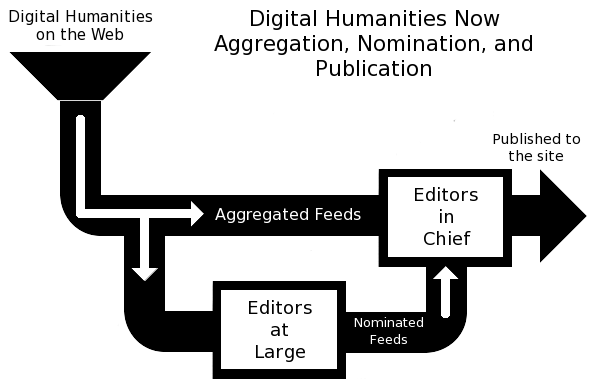This week, our group met with the team behind Digital Humanities Now, an online compendium and journal that searches out and disseminates important scholarship throughout the digital humanities. Although the team has an official editorial staff of three (a number that likely fluctuates with funding), the time required to survey the many thousands of sources can quickly overwhelm even the most efficient team.
In order to continue providing quality content, the DHNow team developed a model in which outside participants volunteer to serve as editors-at-large, scanning through thousands of potential sources (usually RSS feeds) and nominating items for publication through DHNow. The primary editorial staff then choose from those nominations. By implementing this filtering system, the system saves time and energy by redistributing it into low-intensity workloads. The following image demonstrates the flow of information from raw sources to publication.
The solution at which the DHNow team arrived accomplishes two important tasks: first, they’ve widened the scope of DHNow by including more diverse members in the selection process. Opening their reviewing process to others will mean more items are evaluated, different opinions will shine through, and the end result will be more dynamic.
Secondly, they’ve hit upon a system that allows high-quality, high-volume output without overstraining the budget and capabilities of their limited staff. Their system depends on the willingness of others to volunteer time and effort, but thankfully, many digital humanists are happy to oblige.
Overall, the DHNow team has designed and implemented a unique model of operation, if only distinguished by the quantity of content they can now handle. As they move forward, necessary revisions will become apparent, but for now, their system provides traction and momentum for further innovation.


Pingback: Points to Remember about JDH and the Recent “Kerfluffle” | Spencer W. Roberts